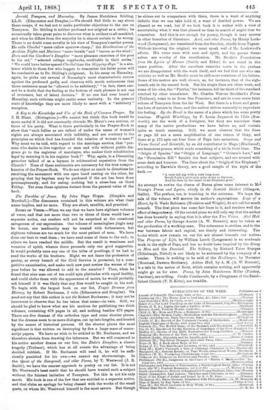Jerrold, Tennyson, and Macaulay. By James Hutchison Stirling, LL.D. (Edmonaton
and Donglas.)—We should find little to say about these essays, if we had not to make particular objections to the one on Tennyson. Dr. Stirling is neither profound nor original as a critic ; he occasionally takes great pains to discover what is evident to all mankind, and when he differs from the majority he is almost certain to be wrong. There is no doubt some novelty in his view of Tennyson's earlier poems. He calls Claribel "mere callow sparrow-cheep ;" the Recollections of the Arabian Nights and Mariana "mere breath " and " barren as the wind ;" Dora and the Gardener's Daughter " mere pleasant exercises of the poet in his art," "selected college copybooks, creditable in their series." " We could have better spared Claribel than the Skipping-Rope" is a sen- tence which to those few who happen to remember the latter poem will be conclusive as to Dr. Stirling's judgment. In his essay on Macaulay, again, ho picks out several of Macaulay's most characteristic sneers against the professed godly, and observes with much seriousness that these sentences must be "allowed to be subrisory," "in fact, there can- not be a doubt that the feeling at the bottom of such phrases is not one of reverence, but of latent derision." If no one had ever heard of Macaulay, such criticism might excite some curiosity. In the present state of knowledge they are more likely to meet with a " subrisory " reception.


































 Previous page
Previous page